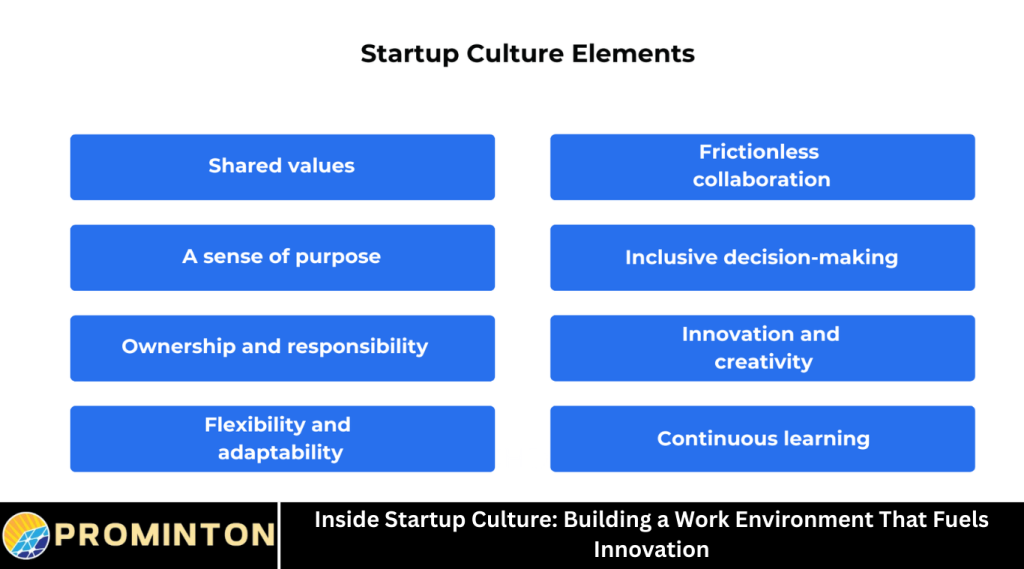Startup culture is often seen as a driving force behind the most innovative companies today. The way startups operate, communicate, and organize themselves creates an environment where new ideas can thrive. For many entrepreneurs and employees, the appeal of working in a startup lies not just in the work itself but in the unique culture that encourages creativity, collaboration, and risk-taking.
Creating a work environment that fuels innovation is essential for startups looking to grow and succeed in competitive markets. This article explores what startup culture really means, how it differs from traditional corporate environments, and what steps companies can take to build a culture that supports continuous innovation. We will also discuss the challenges startups face and offer strategies to overcome them.
Understanding Startup Culture
Startup culture refers to the shared values, beliefs, behaviors, and social norms that define how a startup operates. It shapes how employees interact, make decisions, and solve problems. Unlike traditional companies that may have rigid hierarchies and formal processes, startups tend to be more flexible, informal, and fast-paced.
In startup culture, there is often an emphasis on openness, transparency, and a strong sense of mission. Employees usually feel more connected to the company’s goals and are encouraged to contribute ideas freely. This culture fosters innovation by allowing teams to experiment, learn from failures, and rapidly iterate on new concepts.
Characteristics of an Innovation-Driven Work Environment
An innovation-driven work environment is designed to encourage creativity and problem-solving. Several characteristics define such an environment:
- Openness to new ideas where everyone’s input is valued.
- A collaborative atmosphere that breaks down silos and encourages teamwork.
- A willingness to take risks and accept failure as part of the learning process.
- Flexibility in roles and responsibilities, allowing employees to wear multiple hats.
- Strong communication channels that keep teams aligned and informed.
- A focus on continuous learning and personal growth.
- Empowerment of employees to make decisions and take ownership of their work.
The Role of Leadership in Shaping Startup Culture
Leadership plays a critical role in creating and sustaining startup culture. Founders and managers set the tone by modeling behaviors they want to see. When leaders are transparent, approachable, and open to feedback, they create a safe space for innovation.
Good leaders also clearly communicate the company’s vision and values. This clarity helps employees understand the purpose behind their work and motivates them to contribute meaningfully. Encouraging autonomy and trusting employees to take initiative are also important leadership practices that nurture innovation.
Moreover, leaders should celebrate both successes and failures to reinforce a growth mindset. Recognizing efforts and learning from mistakes helps maintain morale and drive continuous improvement.
Encouraging Collaboration and Teamwork
Collaboration is at the heart of innovation in startups. Bringing diverse perspectives together often leads to more creative solutions. Startups can encourage collaboration by designing open workspaces, facilitating cross-functional teams, and promoting regular communication.
Using tools like project management software and communication platforms helps teams stay connected, especially in remote or hybrid work settings. Encouraging informal interactions such as team lunches or brainstorming sessions also builds trust and rapport among employees.
It is important for startups to create an environment where disagreements can be expressed respectfully and constructively. Healthy debate can spark new ideas and prevent groupthink.
Building a Culture of Experimentation and Risk-Taking
Innovation requires taking risks and trying new things. Startups can create a culture where experimentation is welcomed by framing failure as a valuable learning opportunity rather than a setback.
Providing resources and time for employees to work on passion projects or test new ideas encourages creativity. Some companies set aside regular “innovation days” or “hackathons” where teams can focus on exploring new concepts without the pressure of immediate results.
It is also vital to establish clear processes for testing and validating ideas so that risks are managed wisely. Balancing freedom with accountability ensures that experimentation leads to meaningful progress.
Fostering Continuous Learning and Development
To stay innovative, startups need employees who are always learning. Supporting continuous education and skill development is an important part of the culture.
This support can take many forms, such as offering access to online courses, hosting internal workshops, or encouraging attendance at industry conferences. Mentorship programs help newer employees learn from experienced team members.
Creating a feedback-rich environment where employees receive regular constructive feedback helps individuals grow and adapt. When learning is integrated into daily work, the startup becomes more resilient and prepared for future challenges.
Supporting Work-Life Balance in a Fast-Paced Environment
Startup work can be intense, with long hours and tight deadlines. However, maintaining work-life balance is essential for sustaining creativity and preventing burnout.
Startups that respect employees’ personal time, offer flexible work hours, and promote wellness initiatives create a healthier work environment. Encouraging breaks, physical activity, and time off helps employees recharge and return with fresh ideas.
A culture that values well-being shows employees they are cared for beyond just their output, which builds loyalty and long-term commitment.
Embracing Diversity and Inclusion
Innovation thrives in diverse environments where different backgrounds, experiences, and perspectives come together. Startups committed to diversity and inclusion build stronger teams and create products that serve a wider audience.
This commitment involves recruiting diverse talent, creating inclusive policies, and fostering a culture where everyone feels valued and heard. Training on unconscious bias and open discussions about inclusion help create awareness.
When employees see themselves reflected in leadership and company values, they are more engaged and motivated to innovate.
Challenges in Building and Maintaining Startup Culture
While startup culture can be a competitive advantage, building and maintaining it is not without challenges.
Rapid growth can strain communication and dilute culture. As teams expand, maintaining the same level of transparency and connection becomes harder.
Pressure to meet deadlines and deliver results can lead to burnout or discourage risk-taking.
Remote work and distributed teams create challenges for collaboration and social bonding.
Leaders must be proactive in addressing these challenges by regularly checking in with teams, updating processes, and reinforcing core values.
Strategies for Sustaining an Innovative Startup Culture
To keep a culture that fuels innovation, startups should continuously nurture their environment.
Regularly revisit and communicate company values to ensure they remain relevant.
Encourage open dialogue through town halls, surveys, and feedback sessions.
Invest in leadership development to prepare managers to support and inspire their teams.
Promote internal mobility so employees can explore different roles and bring fresh perspectives.
Celebrate innovation successes and share stories to motivate others.
Remain adaptable to change while holding onto core cultural elements.
The Impact of Technology on Startup Culture
Technology tools have transformed how startup teams collaborate and innovate.
Project management software, communication platforms, and cloud services enable real-time collaboration regardless of location.
Data analytics help startups make informed decisions and track progress on innovation goals.
Artificial intelligence and automation reduce repetitive tasks, freeing employees to focus on creative work.
However, overreliance on technology without personal connection can hinder culture, so balance is key.
Frequently Asked Questions
What is startup culture?
Startup culture is the shared values, behaviors, and social norms that define how a startup operates and how employees interact and work together.
Why is innovation important in startup culture?
Innovation drives growth and helps startups develop unique products or services that can succeed in competitive markets.
How can leaders support an innovation-driven culture?
Leaders support innovation by being transparent, encouraging risk-taking, communicating vision, and empowering employees.
What role does collaboration play in startup culture?
Collaboration brings diverse ideas together, fostering creativity and helping solve problems more effectively.
How can startups encourage risk-taking without fear of failure?
By framing failure as a learning opportunity and providing safe spaces to experiment, startups can promote healthy risk-taking.
Why is diversity important for innovation?
Diversity brings different perspectives and experiences, which leads to better problem-solving and more creative ideas.
How do startups maintain culture during rapid growth?
Startups maintain culture by regularly communicating values, investing in leadership, and promoting open dialogue among teams.
Conclusion
Building a startup culture that fuels innovation is essential for creating companies that can compete and grow in today’s fast-changing world. Such a culture is marked by openness, collaboration, risk-taking, continuous learning, and respect for diversity and well-being.
Despite challenges, startups that invest in their culture create workplaces where creativity thrives and new ideas flourish. This foundation helps startups not only survive but thrive as they bring transformative products and services to market.



